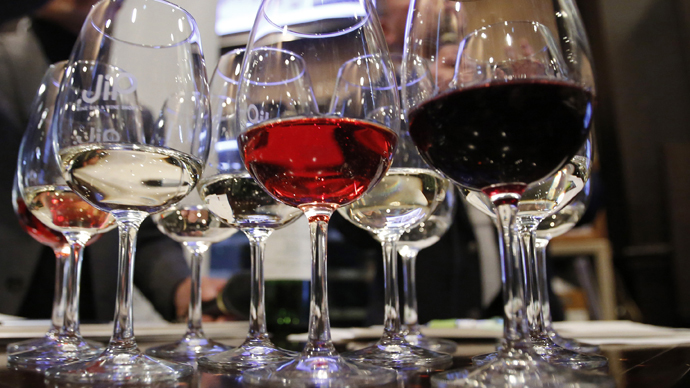Sour grapes? California’s drought has delivered tastier wine – but it may not last

While California continues to struggle with conserving water during a historically bad drought, winemakers have actually been producing tastier wine. With the drought well into its fourth year, though, the industry may be reaching the end of the vine.
This week, California Gov. Jerry Brown signed an executive order requiring cities and towns to dramatically cut down on their water usage. The mandate calls for a 25 percent cut in water use over the next nine months as communities look to survive a drought that’s affected more than 98 percent of the state.
The order didn’t specifically target commercial efforts such as oil exploration, water bottling or agriculture – omissions that have sparked backlash from local activists – but vineyards are nonetheless finding themselves in a difficult situation. Grapes have proven to be extremely resistant to droughts, but water supplies continue to slip.
Grapes Are Drought-Tolerant, Not Invincible - http://t.co/z7h9Vz33L1#Wine#Californiapic.twitter.com/HhMC8NLwvY
— Scott Eddy (@MrScottEddy) April 2, 2015
Already, water supplies are delivering “a fraction” of their usual amount to some vineyards, NBC News reported. The San Joaquin Valley irrigation districts are delivering 35 percent of the water they normally do, at best, while the State Water Project, which manages water across California, is supplying just 20 percent.
For some winemakers, the dwindling water supply has been manageable, especially since dry weather can produce more delicious grapes. When grapevines receive less water, they begin producing smaller grapes, and that means more flavor heavily concentrated in each one. Speaking with the Wall Street Journal last year, vineyard owner Stephanie Honig said the dry climate means vines will look deeper into the soil for water, and that process adds different flavors to the fruit.
The better-tasting grapes have been a boon to wine drinkers and higher-end producers in California, but for vineyards that produce cheaper wine – about $7 a bottle or cheaper – fewer, less juicy grapes mean fewer bottles on the market, and that raises their costs at the same time as competing beverages like craft beer and sake lure customers away, NBC reported.
“The scarcity of water will likely push up prices for wines, especially some of the cheaper ones,” Rowan Gormley, founder of the online retailer NakedWine, said to Fortune earlier this year.
Financial consequences aren’t the only thing on the minds of winemakers, though. Grapevines may be able to withstand droughts for a certain period of time, but they cannot carry on forever – and they may reach their limit soon. Even though the plants can reach up to 100 feet below the ground to get water, the lack of precipitation could cause salt levels to rise and damage the vines.
It might take a while for the plants to become severely damaged, but if they do it will take a long time to nurse them back to health.
READ MORE: California water restrictions should cover oil companies, activists say
“They will shut down and save themselves, and stop producing fruit to save energy,” W. Blake Gray, who helps edit the Wine-Searcher online, told NBC. "It's not like the San Joaquin Valley will shut down overnight. But we will need a torrential downpour for a couple years in a row. In the same sense the vines didn't didn't immediately shut down, they aren't going to immediately jump and recover.”
Since wine’s popularity in America is expected to keep rising, some companies are trying to mitigate the damage by trying out new watering techniques. A company called Fruition Sciences told NBC that farmers can reduce the amount of water they use on grapevines by 40 percent without damaging them. By monitoring water intake via sensors and other technology, this method would also recreate the types of flavorful grapes that grow in dry weather.
Whether or not this idea is viable, though, remains unclear, with some experts saying that the plants need water one way or another. If California keeps running dry, that will stay a problem going forward.












